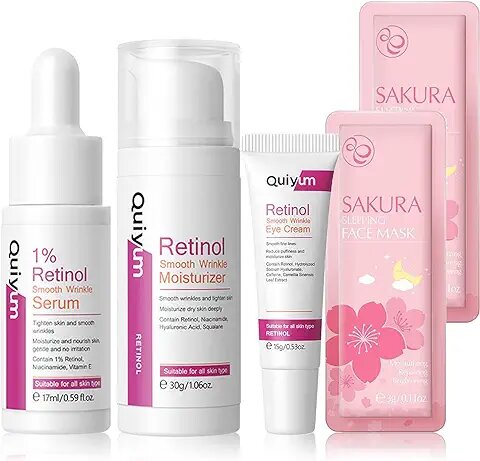The ultimate anti-aging skincare guide: Discover effective ingredients, treatments, and lifestyle tips on GlowGuide to achieve and maintain youthful, radiant skin at any age.
Understanding Skin Aging: More Than Just Wrinkles
The natural aging process affects our skin in various ways, but premature skin aging can accelerate these changes. Let’s explore the key factors influencing skin aging and the visible signs to watch for.
Common Signs of Aging Skin
- Fine lines and deep wrinkles
- Loss of elasticity and firmness
- Uneven skin tone and dull complexion
- Dry, rough skin texture
- Age spots and hyperpigmentation
The Science of Anti-Aging: Key Ingredients for Youthful Skin
Anti-aging skincare products harness the power of scientifically proven active ingredients to combat multiple signs of aging. Let’s dive into the most effective components of a potent anti-aging routine.
1. Retinol and Retinoids: The Gold Standard in Anti-Aging
Retinol, a form of Vitamin A, is widely regarded as the holy grail of anti-aging ingredients. This powerhouse compound offers numerous benefits for aging skin:
- Smooths fine lines and wrinkles
- Evens out skin tone
- Improves skin texture and firmness
- Helps clear acne and prevent breakouts

Neutrogena Rapid Wrinkle Repair Retinol Moisturizer
2. Vitamin C: Brightening and Protecting
As a potent antioxidant, Vitamin C plays a crucial role in anti-aging skincare:
- Brightens and evens skin tone
- Protects against environmental damage
- Boosts collagen production
- Reduces the appearance of dark spots
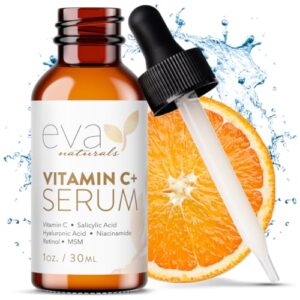
Amazon affiliate link to a Vitamin C serum
3. Peptides: Building Blocks of Youthful Skin
Peptides are short chains of amino acids that stimulate collagen production, improving skin firmness and reducing the appearance of fine lines and wrinkles.
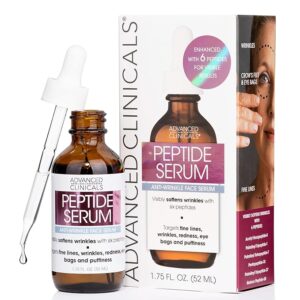
Amazon Affiliate Link to a men’s peptide serum
4. Hyaluronic Acid: The Hydration Hero
Hyaluronic acid attracts and retains moisture, plumping up fine lines and wrinkles for a more youthful appearance.
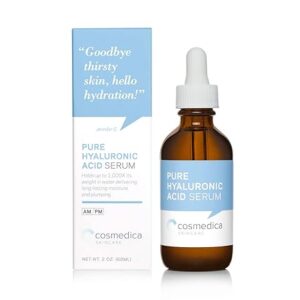
5. Niacinamide: The Multi-Tasking Wonder
Also known as Vitamin B3, niacinamide offers multiple anti-aging benefits, including strengthening the skin barrier and evening out skin tone.
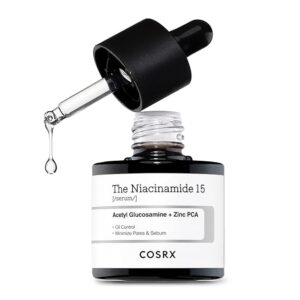
Amazon Affiliate Link to a men’s Niacinamide product
Crafting Your Anti-Aging Skincare Routine
Now that we’ve explored key anti-aging ingredients, let’s discuss how to incorporate them into an effective daily routine:
- Cleanse: A gentle, non-stripping cleanser is crucial for maintaining your skin’s natural barrier while removing impurities. Look for pH-balanced formulas with hydrating ingredients like glycerin or ceramides. Cleanse twice daily, but avoid hot water which can dehydrate and irritate the skin.
- Tone: An alcohol-free toner helps balance your skin’s pH and prepares it for better absorption of subsequent products. Choose toners with hydrating and soothing ingredients like hyaluronic acid or niacinamide. Apply with clean hands or a cotton pad, gently patting into the skin.
- Treat: Serums with active ingredients are the powerhouses of your anti-aging routine. Retinol promotes cell turnover and collagen production, while Vitamin C provides antioxidant protection and brightening effects. Apply these products to clean, dry skin, and consider alternating retinol and Vitamin C between night and day routines respectively.
- Moisturize: A good moisturizer helps lock in hydration and reinforces your skin’s protective barrier. Look for formulas with ingredients like hyaluronic acid, ceramides, or peptides to address anti-aging concerns. Apply to slightly damp skin for better absorption and consider using a richer formula at night.
- Protect: Sunscreen is the most crucial step in preventing premature aging. Choose a broad-spectrum SPF 30+ and apply generously as the final step in your morning routine. Reapply every 2 hours when exposed to sun, and consider using mineral sunscreens for sensitive skin.
Advanced Anti-Aging Treatments: Beyond Daily Skincare
For more dramatic anti-aging effects, consider these advanced treatments:
- Chemical Peels: Chemical peels use a solution to remove the outer layer of skin, promoting cell turnover and revealing fresher, younger-looking skin beneath. They can address various concerns including fine lines, uneven skin tone, and mild scarring. The intensity of peels can range from superficial to deep, with deeper peels providing more dramatic results but requiring longer recovery times.
- Microneedling: Microneedling involves creating tiny punctures in the skin using fine needles, which triggers the skin’s natural healing process and boosts collagen and elastin production. This treatment can improve skin texture, reduce fine lines and wrinkles, and even help with acne scarring. For enhanced results, microneedling is often combined with the application of serums or platelet-rich plasma (PRP).
- Laser Treatments: Laser treatments use focused light energy to target specific skin concerns such as wrinkles, pigmentation, or vascular issues. Different types of lasers can address various skin problems, from surface-level concerns to deeper tissue remodeling. While some laser treatments require downtime, others are non-ablative and allow for quicker recovery, making them suitable for those with busy lifestyles.
- Dermal Fillers: Dermal fillers are injectable treatments used to restore volume, smooth out deep wrinkles, and enhance facial contours. Common filler materials include hyaluronic acid, calcium hydroxylapatite, and poly-L-lactic acid, each with unique properties suited to different areas of the face. Results are immediate and can last from several months to over a year, depending on the type of filler used and the area treated.
Always consult a board-certified dermatologist before starting any advanced treatments.
Lifestyle Factors:
The Ultimate Anti-Aging Skincare Guide to
Healthy, Youthful Skin
While skincare products are crucial, lifestyle factors play an equally important role in maintaining youthful skin:
- Sun Protection: Protecting your skin from harmful UV rays is the single most effective anti-aging strategy. Always wear a broad-spectrum SPF 30+ sunscreen, even on cloudy days, and reapply every two hours when outdoors. Supplement sunscreen use with protective clothing, wide-brimmed hats, and seeking shade during peak sun hours.
- Healthy Diet: A nutrient-rich diet is essential for maintaining healthy, youthful skin from the inside out. Focus on consuming plenty of antioxidant-rich fruits and vegetables, omega-3 fatty acids from sources like fish and nuts, and staying well-hydrated. Consider incorporating foods high in vitamins C and E, as well as foods with collagen-boosting properties.
- Adequate Sleep: Quality sleep is crucial for skin repair and regeneration. Aim for 7-9 hours of sleep per night to allow your body time to produce collagen, repair DNA damage, and reduce inflammation. Establish a consistent sleep routine and consider using a silk pillowcase to minimize friction on your skin.
- Stress Management: Chronic stress can accelerate skin aging by increasing inflammation and breaking down collagen. Incorporate stress-reduction techniques into your daily routine, such as meditation, deep breathing exercises, or yoga. Regular self-care practices can also help manage stress levels and promote overall skin health.
- Regular Exercise: Physical activity promotes healthy, glowing skin by improving circulation and oxygenating skin cells. Aim for at least 30 minutes of moderate exercise most days of the week. Remember to cleanse your skin post-workout to remove sweat and bacteria, and always apply sunscreen before outdoor activities.
Tailoring Your Ultimate Anti-Aging Skincare Guide
Remember that everyone’s skin is unique. Consider these factors when customizing your anti-aging routine:
- Skin Type: Understanding your skin type is crucial for selecting the most effective anti-aging products and treatments. Oily skin may benefit from lighter, non-comedogenic formulas and more frequent exfoliation, while dry skin requires richer, more hydrating products. Combination skin might need different products for different areas of the face, and sensitive skin calls for gentle, fragrance-free options with soothing ingredients.
- Specific Concerns: Addressing individual skin concerns alongside anti-aging efforts can lead to better overall results. For acne-prone skin, look for non-comedogenic anti-aging products and consider incorporating salicylic acid or benzoyl peroxide. Those with hyperpigmentation might benefit from brightening ingredients like vitamin C, kojic acid, or niacinamide alongside their anti-aging routine. For sensitive skin, introduce active ingredients slowly and opt for products specifically formulated to minimize irritation.
- Age: Your skin’s needs change as you age, requiring adjustments to your anti-aging routine. In your 20s and 30s, focus on prevention with antioxidants and sunscreen. As you enter your 40s and 50s, incorporate more intensive treatments like retinoids and peptides to address fine lines and loss of firmness. For mature skin in the 60s and beyond, prioritize intense hydration and treatments that address deeper wrinkles and age spots, while being mindful of increased skin sensitivity.
Conclusion: Embracing Your Journey from the Ultimate Anti-Aging Skincare Guide to Ageless Beauty
The path to younger-looking skin is a journey, not a destination. By understanding the science of skin aging, harnessing effective skincare ingredients, and adopting healthy habits, you can achieve and maintain a radiant, youthful complexion at any age.
Remember, consistency is key in anti-aging skincare. Be patient with your skin, and give new products or treatments time to show results. With the right approach, you can reduce visible signs of aging and enjoy healthy, glowing skin for years to come.
Start your anti-aging journey today and embrace the beauty of healthy, youthful skin!
FAQs About The Ultimate Anti-Aging Skincare Guide
Q: When should I start using anti-aging products?
A: It’s never too early to start! Many dermatologists recommend beginning a basic anti-aging routine in your mid-20s, focusing on prevention and protection.
Q: How long does it take to see results from anti-aging products?
A: Most people start to see improvements within 4-6 weeks, but significant changes may take 3-6 months of consistent use.
Q: Can I use multiple anti-aging products together?
A: Yes, but introduce new products gradually and be mindful of potential interactions. For example, don’t use retinol and Vitamin C at the same time.
Q: Is sunscreen really that important for anti-aging?
A: Absolutely! Sun damage is the leading cause of premature skin aging. Daily sunscreen use is crucial for preventing fine lines, wrinkles, and age spots.
Q: Are natural anti-aging remedies effective?
A: While some natural ingredients have anti-aging properties, scientifically formulated products often provide more consistent and powerful results.

